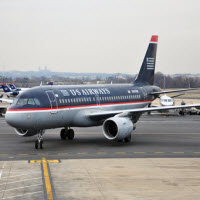Blind Man Thrown Off US Airways Flight Sparks Passengers Mutiny
- Written by Roberto Castiglioni
 All passengers walked off the aircraft following a blind and his dog Doxy being thrown off US Airways Flight 4384.
All passengers walked off the aircraft following a blind and his dog Doxy being thrown off US Airways Flight 4384.
The unprecedented mutiny took place last week Wednesday. Albert Rizzi, a blind man from Long Island, and his dog Doxy boarded US Airways Flight 4384 from Philadelphia to Long Island.
Rizzi, who became blind after surviving meningitis few years ago, has had his guide dog Doxy for seven years. The man was asked to place his guide dog under a seat not too far from him. However, the flight had two hours delay. During that time frame, the guide dog moved back under Rizzi’s seat.
The flight attendant asked the blind man to put the dog back to its original place, a request that triggered a heated argument between the flight attendant and Rizzi.
The captain of the flight, made aware of the argument, returned to the gate and had Rizzi and his guide dog escorted off the US Airways aircraft, at which point all 35 passengers on board the aircraft demanded the flight attendant be thrown off the flight and Rizzi and his guide dog be enplaned again.
US Airways issued the following statement. "In compliance with the Air Carriers Access Act, and the FAA, service animals must be either under the seat in front of a passenger, on their lap (if equal to or smaller than a lap child), or at their feet … but at no time can they be in the main aisle of the aircraft as that is a primary evacuation route. In this instance, the animal was not able to be secured out of the main aisle, and attempts to work with the customer failed to ensure compliance with this safety rule," US Airways spokesperson John McDonald said. "The customer is an advocate for disability rights, and appears to have forced a confrontation with his disruptive behaviour, rather than simply complying with the instruction and securing the dog. Everyone was tired, it was near midnight, and I’m sure patience was in short supply as the aircraft had already been delayed on departure due to a mechanical issue and the animal was restless. We all would be. Once that was communicated by the cabin crew to the flight deck crew, the decision was made to return to the gate to remove the customer and calm the situation."
In other words, the airline says the blind man is the offender, as he was not able to control his guide dog positioning away from where he was seated, and was unable to control the dog after the animal had spent two hours on board while waiting for the flight to depart.
The unprecedented passengers’ mutiny caused the captain to decide to cancel the flight. The airline’s spokesperson had this to say about the other passengers of flight 4384. “Several other passengers, upon seeing the customer’s removal from the flight, piled on to the emotional confrontation, making threats to contact media and make an issue of out ‘kicking a blind man and his dog off a US Airways flight.’ This reduced the FA to tears, and they were unable to continue as they believed their safety was in jeopardy.”
In 2012, US Airways was the legacy carrier totalling the highest number of disability related complaints per passengers flown. The airline, currently merging with American Airlines, carried 62,524,816 passengers and received 70 disability related complaints (tot. pass/ dis. comp. ratio 0.00011). By comparison, budget carrier Southwest carried 133,978,100 passengers and received 41 complaints from passengers with disabilities (tot. pass/ dis. comp. ratio 0.000030).
At the beginning of November, the U.S. Department Of Transportation fined US Airways $1.2 million for failing to provide adequate wheelchair assistance to passengers with disabilities in Philadelphia and Charlotte, N.C.
Aviation Enforcement Office found that US Airways committed a significant number of violations of the requirements for wheelchair assistance during 2011 and 2012 at Philadelphia International Airport and Charlotte Douglas International Airport.
Of the $1.2 million fine, US Airways may use up to $500,000 for improvements in its service to passengers with disabilities that are beyond what DOT rules require.










